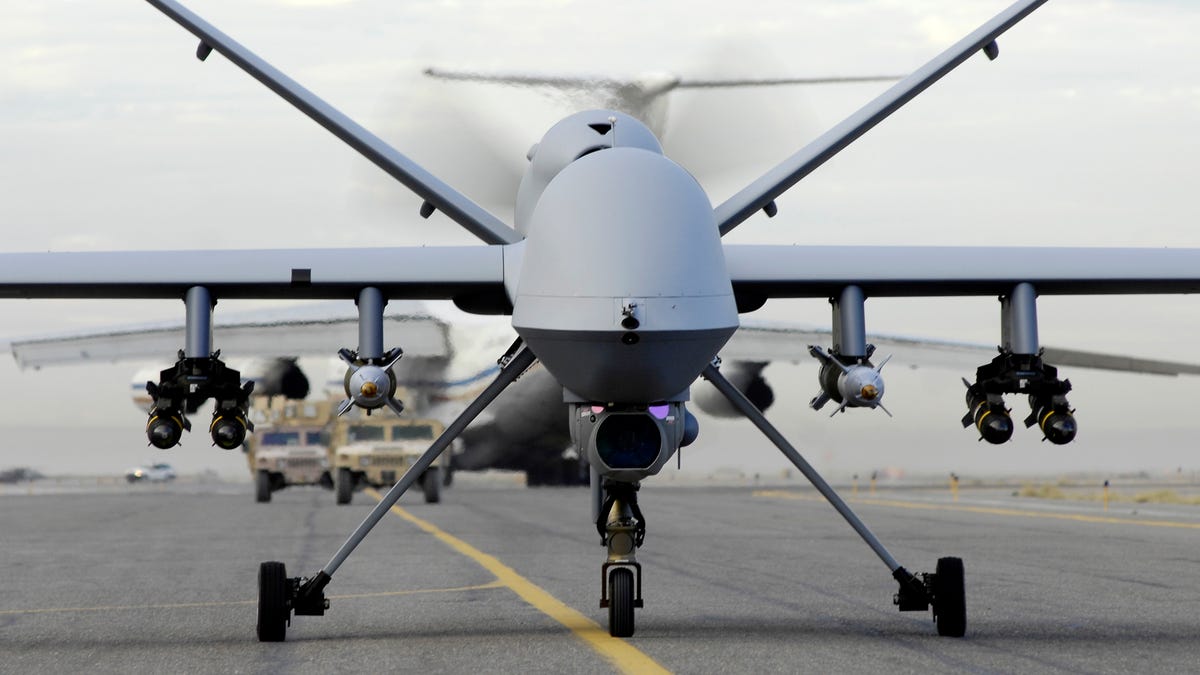House orders Pentagon to disclose domestic drone use
The Pentagon operates drones abroad that are armed with sophisticated sensors, Hellfire missiles, and laser-guided bombs. The House of Representatives wants to know if they're used at home.

The U.S. House of Representatives voted yesterday to require the Defense Department to disclose whether military drones are being operated domestically to conduct surveillance on American citizens.
A requirement buried in a lengthy appropriations bill calls on newly confirmed Defense Secretary Chuck Hagel to disclose to Congress what "policies and procedures" are in place "governing the use" of military drones or other unmanned aerial vehicles (UAVs) domestically. The report is due no later than 90 days after the bill is signed into law.
The vote on the bill, which was overwhelmingly supported by Republicans and opposed by Democrats, comes as concerns about domestic use of drones have spiked. Sen. Rand Paul, a Kentucky Republican, launched the first filibuster in three years yesterday to call attention to the Obama administration's drone policy, and CNET reported last weekend that Homeland Security required that its UAVs be capable of "signals interception" and "direction finding" of cell phones in use on the ground.
"I think the drone issue has crystalized many of the public anxieties and frustrations surrounding the decade-old war on terror, including many concerns that have nothing to do with drones," says Steven Aftergood, who directs the Project on Government Secrecy at the Federation of American Scientists. "The executive branch has been stingy with information, and that has created a vacuum that is now being filled with reactions of all kinds."
The appropriations measure, which is now before the Senate, notes that the U.S. Air Force has "policies and procedures in place governing the disposition of UAV [surveillance] that may inadvertently capture matters of concern to law enforcement agencies." The bill says "it is unclear" if other branches of the military -- the Navy and Marine Corps operate drones as well, for instance -- currently follow "similar policies and procedures."
Last year, the U.S. Air Force adopted a drone policy (PDF) that says its unmanned aircraft "will not conduct nonconsensual surveillance on specifically identified U.S. persons, unless expressly approved by the Secretary of Defense." It also says, however, that "collected imagery may incidentally include U.S. persons or private property without consent."
A National Guard policy (PDF) adopted last year includes similar language, saying neither its manned nor unmanned aircraft may "conduct nonconsensual surveillance on any specifically identified U.S. persons" -- unless approved by the Secretary of Defense and permitted by law.
The House's language stops short of requiring Hagel to disclose whether he or his predecessor have taken the step of approving the targeting of any U.S. citizens for surveillance.
Concern about domestic use of drones is growing, with federal legislation introduced last month that would restrict arming drones, in parallel with similar efforts from state and local lawmakers. The Federal Aviation Administration recently said that it will "address privacy-related data collection" by drones, and Rep. Austin Scott, a Georgia Republican, on Tuesday introduced a bill, H.R. 972, that would require police to obtain warrants before sending drones on domestic surveillance missions.
The prospect of widespread surveillance from the skies concerns civil libertarians, who say the technology billed as securing the United States' land and maritime borders could be used inside the nation's borders. Michael Kostelnik, the Homeland Security official who created its drone program, told Congress that the department's drone fleet would be available to "respond to emergency missions across the country," and a Predator drone was dispatched to the tiny town of Lakota, N.D., to aid local police in a dispute that started with who owned six cows. The alleged cow-nabber arrested through Predator surveillance lost a preliminary bid to dismiss the charges.
Sen. Paul's filibuster yesterday, which lasted about 13 hours, may have done the most of any of these recent efforts to raise the profile of drone misuse. Paul attempted to block the nomination of John Brennan, President Obama's nominee to be CIA director and supporter of overseas use of drone strikes, until the administration answered questions about domestic targeting of civilians.
"I will speak as long as it takes, until the alarm is sounded from coast to coast that our Constitution is important, that your rights to trial by jury are precious, that no American should be killed by a drone on American soil without first being charged with a crime, without first being found to be guilty by a court," Paul, who was eventually joined by some Republican colleagues and Democratic senator Ron Wyden, said on the Senate floor.
Paul received his response today, when Attorney General Eric Holder responded in a terse letter (PDF) saying that the president does not have the authority to "use a weaponized drone to kill an American not engaged in combat on American soil."

